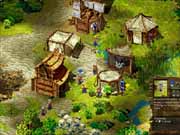Cultures is the North American release of last year's game of the same name, which was published in Europe around Christmas. Created by German development house Funatics, it's a perfect example of the kind of slow-paced city-building game that tends to be quite popular in Europe but never seems to catch on in the States. Judging from the gameplay in Cultures, it's clear why such games aren't popular here.

The campaign's story follows the voyage of a group of Vikings from a village in Greenland who are seeking the remains of a meteor--described as the "six pieces of the sun"--that has fallen to Earth. Each mission sees them travel farther in their quest across the campaign map, where they will encounter Eskimos, Indians, and other natives of Greenland. Unfortunately, the story tends to get lost in the general sense of repetition found in the gameplay, so there isn't the sense of an epic, continuous campaign.
Cultures follows in the well-worn footsteps of games such as The Settlers and 1602 A.D. by creating a game universe that seems to exist as much for its own sake as for the sake of the game. In fact, a reasonable description of Cultures is to call it a cross between The Sims and 1602 A.D., with the latter game's glacial pace. Cultures includes elements such as trade and combat, but the need to pay attention to tiny details and the fact that it can take an hour of play just to construct a basic settlement means that you have to be engaged by the world itself or you'll quickly become bored. Unfortunately, even the stand-alone scenarios that begin with a built-up town (of which there are several) still don't have much to recommend them.
Like many other games of its type, Cultures is based on producing food and raw materials to expand your settlement and increase its population. You assign your Vikings to build various structures, and once these structures are built you assign workers to man them. The more a Viking performs a particular task, the better he becomes at it, until he earns a "diploma" and becomes certified in that skill. The skill tree requires expertise in one skill before progressing to the next: To become a miller, for instance, a Viking must first become a master farmer. The linear building dependencies mirror this scheme, and through this gradual advancement you'll eventually have temples, weapons makers, carpenters, and all sorts of other buildings and artisans. Despite the storyline, the actual gameplay doesn't do much to evoke the feeling of a Viking saga and actually seems fairly bland.
The game is similar to The Sims in that each Viking has a name and varying needs for things like food, sleep, entertainment, and religion. If your Vikings aren't assigned to a specific house, they'll sleep on the ground, which makes them less efficient. Likewise, homeless Vikings will scavenge for food when they get hungry, so it's much more efficient to have them get married and live in a dwelling, where their wives will fix them lunch (seriously). Unfortunately, making housing assignments and ensuring that your Vikings have had enough sleep is about as interesting as the decisions get.

There's a lot of gameplay in Cultures, but it's mainly because the designers keep forcing you to do the same thing over and over. Completing the entire campaign as well as the stand-alone scenarios may take a lot of time, but long before you get there, the gameplay will have become excruciatingly repetitive. Each of the 13 campaign scenarios requires you to build up your settlement essentially from scratch, so you can look forward to building the same huntsman's tent, woodcutter's shed, farms, and other basic structures time and time again. You'll also spend a lot of time performing other mundane tasks, like arranging marriages between your Vikings and instructing them to have children. When you send scouts or soldiers on long journeys, you have to specifically instruct them to eat, or they will starve. Despite having to do so much micromanagement, you'll still feel like the game drags along because it'll take you so much time to make any progress. Even the simplest scenarios can easily take several hours if you get sidetracked, and the advanced scenarios are much, much longer.
The lack of variation and seemingly interminable build times suggest that you're supposed to become attached to the Vikings and their little world, but there really isn't much to become attached to. The mediocre graphics, repetitive soundtrack, and clumsy interface do little to remedy this problem. Cultures suffers from a lack of personality because it feels like an amalgam of other games in this genre rather than a distinct design. If you're interested in city-building games, there are far better ones available that are more worthwhile.